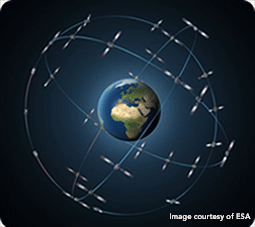Two new satellites join the Galileo Constellation

On 27 March at 21:46 GMT (22:46 CET, 18:46 local time) the satellites Galileo 7 and 8 successfully blasted off from Europe’s Spaceport in French Guiana on top of a Soyuz rocket.
All the Soyuz stages performed as planned, with the Fregat upper stage releasing the satellites into their target orbit at an altitude of 23,500 km, around 3 hours 48 minutes after liftoff.
Following initial checks, now being run jointly by ESA and France’s CNES space agency from the CNES Toulouse center, the two satellites will be handed over to the Galileo Control Centre in Oberpfaffenhofen, Germany and the Galileo in-orbit testing facility in Redu, Belgium for testing before they are commissioned for operational service, scheduled for the middle of this year.
Galileo 7 and 8 will join the six satellites already launched in pairs, in October 2011, October 2012 and August 2014.
GMV has played a key part in the GALILEO program right from the word go. GMV has supplied several key elements for the system’s ground segment such as OSPF (Orbit & Synchronisation Processing Facility), IPF (Integrity Processing Facility), SPF (Service Product Facility), FDF (Flight Dynamics Facility) and MNE (MDDN Network equipment). GMV is also currently the main contractor for providing Galileo’s essential Timing and Geodetic Validation Facility (TGVF) services; it is co-leading development of the European Union’s GNSS Service Centre (GSC) and is leading the development of Galileo’s commercial service (CS) demonstrator.
Europe’s GALILEO satellite navigation system, being jointly developed by the European Commission and the European Space Agency (ESA), is due to begin providing navigation services by late 2015 with full system capability in place by 2020. Four other satellites, currently in testing and final-integration stage, will be launched by the end of 2015.
The total Galileo constellation will consist of 30 satellites in three orbital planes, with their corresponding ground infrastructure. It will provide high-precision global geo-positioning services that are interoperable with the US GPS system and Russia’s GLONASS system, considerably boosting Europe’s technological Independence.